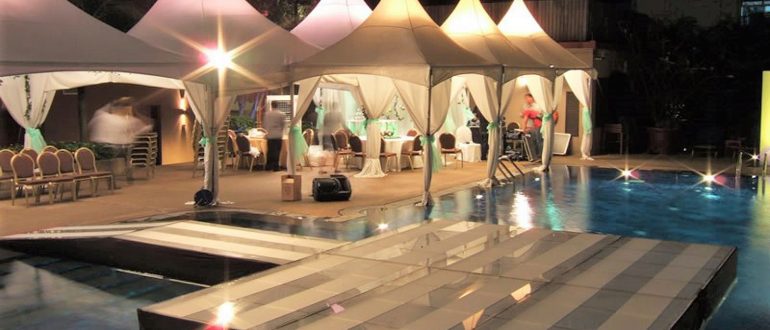Hosting a multi-stage outdoor event can be a rewarding but challenging endeavour. Whether you’re planning a music festival, a sports competition, or a cultural fair, the logistics of coordinating multiple stages and activities require meticulous planning and execution.
This guide will walk you through the essential steps to ensure your event runs smoothly, delighting your attendees and leaving a lasting impression.
Planning and conceptualisation
Define your vision
The first step in hosting a successful multi-stage outdoor event is to have a clear vision. What is the purpose of your event? Who is your target audience? Answering these questions will help shape the overall concept and theme of your event. Once you have a vision, create a detailed plan that outlines the key components, such as the number of stages, types of performances or activities, and any special features that will make your event unique.
Budgeting
A well-planned budget is crucial for managing expenses and ensuring financial viability. Consider all potential costs, including stage design, stage construction, sound and lighting equipment, security, permits, and marketing. Allocate a portion of your budget for unexpected expenses to avoid any last-minute financial stress.
Venue selection
Choosing the right location
The success of your event heavily depends on the choice of venue. Look for a location that can comfortably accommodate your expected audience and has adequate space for multiple stages. Consider factors such as accessibility, parking, and proximity to public transportation. Additionally, ensure that the venue has the necessary permits for hosting large gatherings and live performances.
Site layout
Once you have chosen a venue, create a detailed site layout. This should include the placement of stages, food and beverage areas, restrooms, emergency exits, and other essential facilities. A well-thought-out layout will help in crowd management and enhance the overall attendee experience.
Permits and regulations
Obtain necessary permits
Hosting a large-scale outdoor event typically requires multiple permits. Contact local authorities to understand the specific requirements and ensure you have all the necessary documentation well in advance. This may include permits for noise levels, food and beverage sales, and crowd control.
Safety and compliance
Safety should be a top priority when hosting any event. Develop a comprehensive safety plan that includes emergency response procedures, medical services, and security measures. Ensure that your event complies with all local regulations and industry standards to avoid any legal issues.
Infrastructure and equipment
Stage construction
The stages are the focal points of your event, so invest in quality stage construction. Depending on the type of performance or activity, you may need different sizes, height and number of counterweights. Work with professional stage designers to create structures that are safe, durable, and visually appealing.
Sound and lighting
High-quality sound and lighting equipment are essential for creating an immersive experience. Hire experienced technicians to manage the setup and operation of these systems. Conduct thorough sound checks and lighting rehearsals to ensure everything runs smoothly during the event.
Tentage and shelter
Providing adequate shelter is crucial, especially for outdoor events in unpredictable weather. Consider tentage rental in Singapore to ensure your attendees are comfortable regardless of the weather conditions. Tents for rent come in various sizes and styles, suitable for different parts of your event, such as VIP areas, dining zones, and information booths.
Event programming
Curate a diverse lineup
A diverse lineup of performances and activities will keep your audience engaged throughout the event. Balance headline acts with emerging talent and include a mix of genres and styles. Create a detailed schedule and communicate it clearly to your attendees.
Engaging activities
In addition to stage performances, incorporate interactive activities to enhance the attendee experience. This could include workshops, games, photo booths, and more. Engaging activities will encourage attendees to stay longer and explore different parts of your event.
Marketing and promotion
Build a marketing strategy
A comprehensive marketing strategy is essential for attracting attendees to your event. Utilise various channels, including social media, email marketing, and traditional advertising. Collaborate with influencers and local media to reach a wider audience.
Ticketing and registration
Simplify the ticketing and registration process to encourage more people to attend. Offer early bird discounts and group packages to attract different segments of your target audience. Use reliable ticketing platforms that provide a seamless experience for your attendees.
Event day management
Staff and volunteers
Recruit a team of dedicated staff and volunteers to manage different aspects of your event. Clearly define roles and responsibilities and provide thorough training to ensure everyone is prepared. Effective communication and coordination are key to smooth event operations.
Attendee experience
Focus on creating a positive experience for your attendees. Provide clear signage, accessible facilities, and helpful information desks. Monitor crowd flow and address any issues promptly to maintain a safe and enjoyable environment.
Feedback and evaluation
After the event, gather feedback from attendees, performers, and staff. Analyse this information to identify areas of improvement for future events. A detailed evaluation will help you refine your planning and execution processes.
Conclusion
Hosting a multi-stage outdoor event requires meticulous planning, coordination, and execution. By following this guide, you can create a memorable experience that delights your attendees and stands out in their minds. For essential infrastructure, consider Nanyang Inc, a leader in tentage rental in Singapore. With their wide range of tents and event furniture for rent, you can ensure your event is well-prepared for any weather condition. For more information, visit Nanyang Inc.
With careful planning and attention to detail, your multi-stage outdoor event will be a resounding success, leaving attendees eagerly anticipating your next production.




